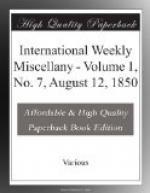at the head of the home department, where he remained
undisturbed till the political demise of Lord Liverpool
in the spring of 1827. The most distinguished
man that has filled the chair of the House of Commons
in the present century was Charles Abbott, afterward
Lord Colchester. In the summer of 1817 he had
completed sixteen years of hard service in that eminent
office, and he had represented the University for
eleven years. His valuable labors having been
rewarded with a pension and a peerage, he took his
seat, full of years and honors, among the hereditary
legislators of the land, and left a vacancy in the
representation of his alma mater, which Mr.
Peel above all living men was deemed the most fitting
person to occupy. At that time he was an intense
tory—or as the Irish called him, an Orange
Protestant of the deepest dye—one prepared
to make any sacrifice for the maintenance of church
and state as established by the revolution of 1688.
Who, therefore, so fit as he to represent the loyalty,
learning, and orthodoxy of Oxford? To have done
so had been the object of Mr. Canning’s young
ambition: but in 1817 he could not be so ungrateful
to Liverpool as to reject its representation even
for the early object of his parliamentary affections.
Mr. Peel, therefore, was returned without opposition,
for that constituency which many consider the most
important in the land—with which he remained
on the best possible terms for twelve years.
The question of the repeal of the penal laws affecting
the Roman Catholics, which severed so many political
connections, was, however, destined to separate Mr.
Peel from Oxford. In 1828 rumors of the coming
change were rife, and many expedients were devised
to extract his opinions on the Catholic question.
But with the reserve which ever marked his character,
left all curiosity at fault. At last, the necessities
of the government rendered further concealment impossible,
and out came the truth that he was no longer an Orangeman.
The ardent friends who had frequently supported his
Oxford elections, and the hot partisans who shouted
“Peel and Protestantism,” at the Brunswick
Clubs, reviled him for his defection in no measured
terms. On the 4th of February, 1829, he addressed
a letter to the vice-chancellor of Oxford, stating,
in many well-turned phrases, that the Catholic question
must forthwith be adjusted, under advice in which
he concurred; and that, therefore, he considered himself
bound to resign that trust which the University had
during so many years confided to his hands. His
resignation was accepted; but as the avowed purpose
of that important step was to give his constituents
an opportunity of pronouncing an opinion upon a change
of policy, he merely accepted the Chiltern Hundreds
with the intention of immediately becoming a candidate
for that seat in parliament which he had just vacated.
At this election Mr. Peel was opposed by Sir Robert
Inglis, who was elected by 755 to 609. Mr. Peel
was, therefore, obliged to cast himself on the favor
of Sir Manasseh Lopez, who returned him for Westbury,
in Wiltshire, which constituency he continued to represent
two years, until at the general election in 1830 he
was chosen for Tamworth, in the representation for
which he continued for twenty years.




